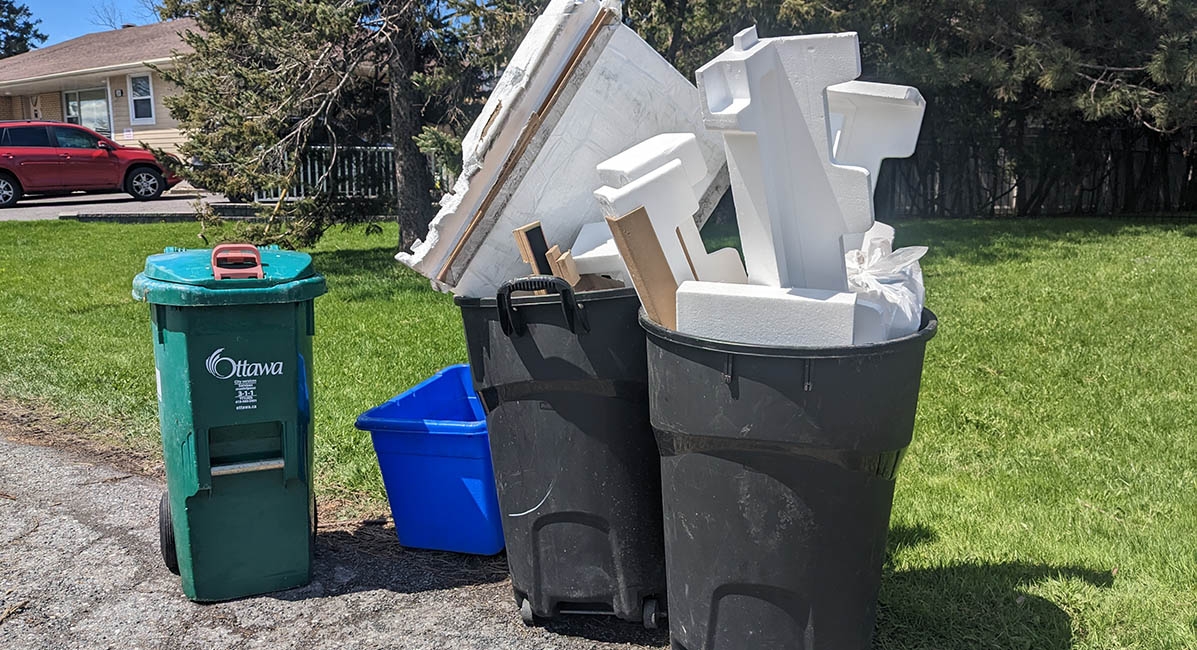
Garbage Bin and Bag Tagging Coming to Ottawa
The City of Ottawa is pursuing a garbage bag tagging scheme that will force residents to pay for any garbage they put out beyond two bags for bi-weekly pickup. The pay-to-throw strategy will see residents given 55 tags yearly and pay three dollars for each additional bag tag. The policy has a caveat: one full garbage container will count as one garbage item regardless of how many bags are in it. The creation of this system is to reduce waste going to landfills.
City staff believe that the proposed cap on garbage and an extra fee will reduce waste by 19 percent in the first year and as much as 28 percent by the fifth year. The program will cost taxpayers $1.5 million annually and comes with two education and enforcement staff.
The policy will likely become law in Ottawa but has a ways to go. It needs approval from the Environment and Climate Change Committee at their June 5th meeting. From there, it will go to Council, who will debate and vote on the motion at their June 14th meeting.
The Chair of the Environment and Climate Change Committee, Councillor Shawn Menard, is a firm advocate of the program and has created a Twitter thread on the policy's benefits. The Capital Ward Councillor notes that the City of Ottawa’s landfill system will likely hit capacity within 15 years, and creating a new landfill would cost the city $300 million, while a garbage incineration plant would cost even more, $400 million.
Menard says that the proposed regulation allows one standard 140L garbage bin to be put at the curb. On Twitter, Menard is answering questions, including one from a concerned resident about the program's impact on large or multi-generational households. The councillor clarified that city staff are looking at an “equitable” solution to “mitigate impacts.”
Condos, apartment buildings, and commercial businesses will be exempt from the tagging regulations. This begs the question, if these areas are exempted, what's to stop Ottawa residents from throwing away garbage in retail dumpsters, which are located near almost every gas station and retail location in the city? City staff have already admitted that there will likely be a rise in illegal dumping in the first few months of the program.
Another concerned resident pointed out that citizens already pay for garbage pick up, to which Menard retorted as being one of the lowest garbage collection rates for the taxpayer in the country. He further stated that the program's intent is not to generate revenue but to reduce waste.
The proposed policy may be new to Ottawa, but other municipalities, including Kingston, Toronto, and Gatineau, use the system. Gatineau’s system started with approved city garbage pails and forced residents to throw extra waste produced in city-approved bags that cost 50 cents per bag. The Quebec municipality has since replaced paid bags with bag tags. The program has been successful, with municipal waste output down by 25 percent between 2018 and 2022. Only 18 percent of Gatineau residents paid to throw extra garbage when surveyed about the program.
While the program may pass the Environment and Climate Change Committee, more conservative-leaning members of Council may not be as willing to get behind the program, so its passing is entirely possible but not written in stone.
During the 12 years of former Mayor Jim Watson’s administration, Ottawa City Council never debated a motion regarding a similar change in service, even while neighbouring Gatineau implemented a program. Now that the Environment and Climate Change Committee has a leading progressive councillor as chair, with the support of Mayor Mark Suttcliffe, who has repeatedly expressed his support for climate initiatives, the policy seems likely to make it through the committee.
If Ottawa does implement the policy, it will hardly be a first in Canada, or even Ontario, with nearby Almonte and Carleton Place already using garbage tags.
Photo: OLM Staff









